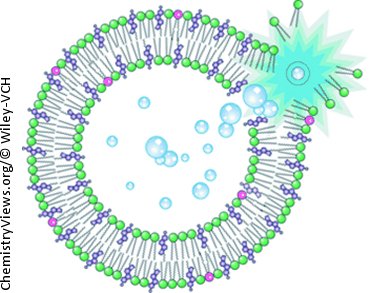A team of researchers from the USA and Taiwan have developed a thermally responsive liposomal system that does not contain anticancer drugs but can kill cancer cells. The liposomes contain ammonium bicarbonate, which decomposes upon heating at 42 °C to form CO2 bubbles. The formation, growth, and collapse of the bubbles lead to a cavitation force that disrupts the lysosomal membrane and to cell necrosis after proteolyic enzymes are released into the cytosol. Micrographs of cells before and after treatment are shown below.

Younan Xia, Hsin-Wen Sung, and their co-workers explain how their system overcomes the problems associated with loading liposomes with anticancer drugs, as this approach can lead to normal cells being harmed by any remaining anticancer drug, and drugs can undergo further reactions to produce species that have dangerous side-effects.
To show that their drug-free treatment did not harm nearby cells, the team carried out an experiment where two sets of cells were grown in chambers separated by a microporous membrane, which was too small for the liposomes, but large enough for any decomposition products to pass through. One set of cells were treated with the liposomes and underwent necrosis, while the set of cells on the other side of the membrane remained alive, thus showing that only the directly treated cells were harmed and any decomposition products did not affect neighboring cells.
- A Liposomal System Capable of Generating of CO2 Bubbles to Induce Transient Cavitation, Lysosomal Rupturing, and Cell Necrosis,
Min-Fan Chung, Ko-Jie Chen, Hsiang-Fa Liang, Zi-Xian Liao,Wei-Tso Chia, Younan Xia, Hsing-Wen Sung,
Angew. Chem. Int. Ed. 2012.
DOI: 10.1002/anie.201205482 - Angew. Chem. 2012.
DOI: 10.1002/ange.201205482



